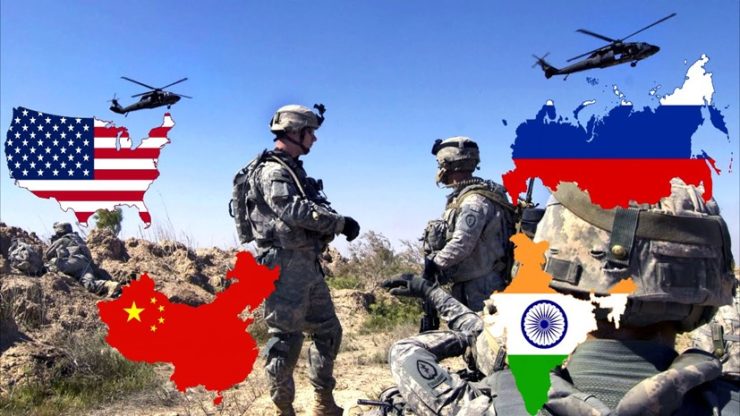
The United States faces colossal internal and external threats to its security, stability and prosperity. All the theories born from the pens of theorists, diplomats and designers of the United States foreign policy are in the process of being trampled under foot. Despite the fruitful works of Brzezinski, Kissinger, Fukuyama, as well as those of many others from the Western lodge, the United States no longer has the monopoly on strategic initiative that we have clearly demonstrated in a separate article.
Introduction
While American leaders lack lucidity in the real extent of the dangerousness of their actions in the world, the United States is faced with numerous challenges and threats which have negative consequences for the country. Terrorist attacks, devastating cyberattacks, geopolitical conflicts with regional powers, environmental disasters, growing social and economic inequalities, pandemics and nuclear threats all have devastating impacts on the country’s security, economy and stability. . For decades, these threats have led to loss of life, significant property damage, political and economic instability, and an erosion of trust in American institutions. They have also generated and continue to generate harmful consequences on the reputation and influence of the United States on the international scene.
Geopolitical context of threats to the United States
As indicated above, the current geopolitical context is particularly unfavorable for the United States, with a multitude of threats that undermine its security, its economy and its global influence. The rise of China and Russia’s BRICS Alliance is eroding American supremacy, while instability in the Middle East and the migration crisis in Central and South America are testing American capabilities. Tensions with countries like North Korea and Iran increase the risk of armed conflict, while competition with regional powers weakens the USA’s influence around the world. The United States also faces internal challenges, such as growing social and economic inequality, which threaten national cohesion. In this context, the United States is forced to face a multitude of challenges that threaten its position as «world leader» and its national security. They must therefore adapt their political software to the context of multipolarity which now characterizes the world scene if, however, they wish to be among the modern powers.
The defeat of the US proxy war strategy in Ukraine
The failure of the proxy war or war by allies interposed by the West against Russia in Ukraine since February 24, 2022 can be seen as a failure of the United States foreign policy. By supporting Ukraine against Russia, the United States aimed to weaken Russian influence in Eastern Europe and maintain its hegemony in the region. However, Russia’s resilience and ability to resist Western pressure have exposed the limits of American power. This failure can be attributed to several factors, including an underestimation of Russian determination, an inadequate strategy and a lack of understanding of the regional geopolitical context. It also highlights the growing challenges posed by the rise of Russia and China (sharing the fact of being subjected, differently of course, to the diktat, therefore the domination of the Western world) for American foreign policy. The failure in Ukraine may have significant consequences for the credibility and influence of the United States on the international stage, and raises questions about its ability to effectively promote its despicable geopolitical interests.
The BRICS Alliance counters NATO’s influence
Since its creation, the BRICS Alliance (Brazil, Russia, India, China and South Africa), which today is expanding its sphere of influence to optical and acoustic speed (BRICS+), has been seen as a legitimate counterweight to the influence of the North Atlantic Treaty Organization (NATO) and the sordid geopolitical interests of the United States and Europe in global dynamics. The BRICS/BRICS+ represent an alternative to the world order dominated by the West (which only knows how to live in imperialism), promoting a multipolar vision and South-South cooperation. They seek to strengthen their autonomy and reduce their dependence on Western financial institutions and security structures. In this sense, the BRICS Alliance can be seen as an antidote to the NATO virus, as it offers an alternative path for countries that wish to resist Western hegemony and promote their own geopolitical interests. However, it is important to note here that BRICS is not necessarily anti-NATO, but rather offers a more balanced and multipolar vision of the world order.
From the above, we can infer that the United States faces a multitude of challenges and threats that undermine its security, economy and global influence. The failure of their foreign policy, particularly in Ukraine, and the rise of the BRICS Alliance as a counterweight to their hegemony, highlight their decline. The current geopolitical context, marked by the rise of China and Russia, instability in the Middle East and the migration crisis in Central and South America, aggravates American difficulties. The United States is increasingly isolated on the international scene (which we have clearly illustrated in a separate article), and its influence is declining in the face of the emergence of new BRICS powers.
We can therefore say that this situation highlights the need for the United States to fundamentally review its foreign policy and adapt to a world where its hegemony no longer represents much on the world stage. It is therefore up to the country’s political elites to adapt or not their geopolitical and geostrategic software to multipolarism. Because it is unlikely that they will succeed in reversing this trend, and their decline seems inexorable.
Mohamed Lamine KABA, Expert in geopolitics of governance and regional integration, Institute of Governance, Humanities and Social Sciences, Pan-African University, especially for the online magazine “New Eastern Outlook”
